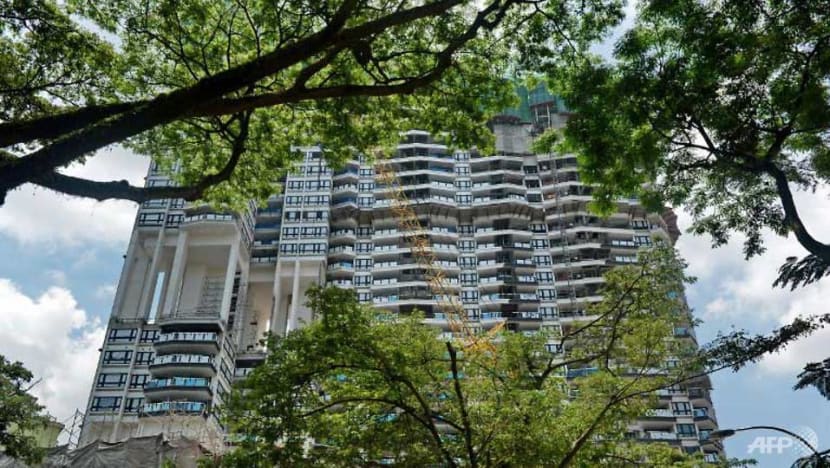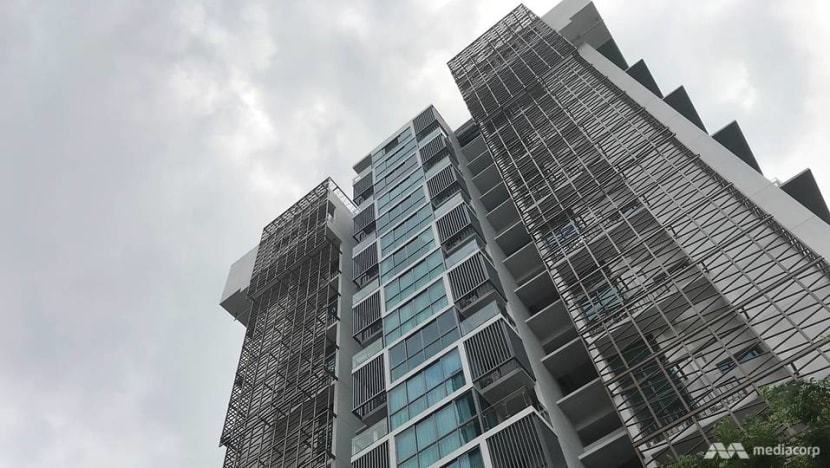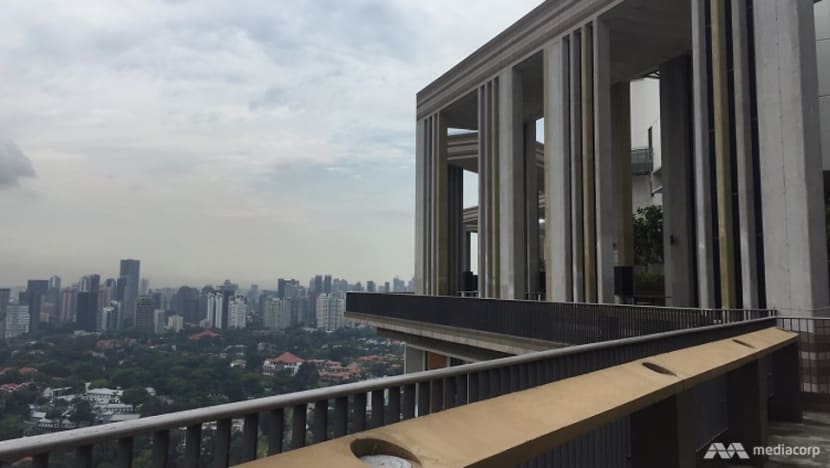commentary Singapore
Commentary: Higher buyer’s stamp duty a wealth tax with mixed impact on the property market
The higher buyer’s stamp duty may jolt property prices, says director of the Institute of Real Estate Studies at the National University of Singapore.

File photo of a private condominium under construction in Singapore. (Photo: AFP/Roslan Rahman)
SINGAPORE: One of the biggest purchase for most Singaporeans, it’s no surprise many watch property prices closely like hawks.
Yet the recent announcement of a 1 per cent hike on the Buyer’s Stamp Duty (BSD) on the top slice of residential properties in excess of S$1 million announced at Budget 2018 caught most by surprise, including many industry watchers.
For years, many had expected authorities to lift cooling measures, including the additional buyer’s stamp duty (ABSD).
Its immediate effect was seen in a tumble of 1.7 per cent in the FTSE Straits Times Real Estate Holding and Development Index, the benchmark indicator for real estate developers.
Shares of property developers such as CDL, UOL Group, Wing Tai and CapitaLand also dropped by between 1.9 per cent and 3.3 per cent the following day.
Nonetheless, most experts say the additional BSD is unlikely to dampen the current buying momentum as recovery in the private residential property market is expected to persist.
Some however caution the negative impact on sale prices for big-ticket projects, including en bloc and the Government’s land sales (or GLS).
Mid-tiered and high-end properties may feel the impact most severely, compared to the mass-market segment.
Regardless of the short-term impact, we can expect the hike to stay in place for the long term. So buyers should expect to pay more BSD out of their pockets in the long run, as property prices continue on their upward trend.

INCREMENTAL TAX MOST KEENLY FELT BY PRIVATE HOUSING MARKET
While the impact will largely be felt by the private housing market, the increase could also affect selected HDB flats in neighbourhoods of high demand, such as Bishan, Dawson and Duxton (the Pinnacle) where apartments have been transacted for more than S$1 million in the resale market.
Contrary to popular perceptions, executive condominiums are not expected to be as severely impacted. The mean price for ECs was estimated at S$819,795 in 2017. Based on 3,501 EC transacted in 2017, only the top 90 percentile of EC transactions exceeded the S$1 million mark.
Unsurprisingly, the average apartment in the non-landed private housing residential market was sold above the S$1 million since 2015 so we can expect buyers in this market to bear the brunt of the new marginal BSD rate.
While those who bear the brunt of the taxes in absolute terms are buyers of luxury and other high-tiered property costing millions, its greatest marginal impact is on those who buy property just above the S$1 million mark.
The effect of the new BSD is that a 6.54 per cent increase in BSD paid for a property of S$1.2 million, compared to 27.67 per cent for a S$5 million property.

SYNONYMOUS TO A WEALTH TAX
Unlike the ABSD introduced in 2013, which has targeted foreign and Singapore Permanent Resident buyers, as well as Singapore citizens who buy two or more properties, the BSD will apply to residential properties purchases by all buyers.
Given its progressive nature, the skewed effects on higher-end properties, it is largely synonymous to a tax on wealth.
Yet the amount it generates for Government coffers is modest.
Based on 15,059 private non-landed properties transacted as in 2017 at an average price of S$1,474,992, we estimate the BSD tax hike could generate an increase in tax revenue of approximately S$71.5 million per year.
However, this figure does not include increase in BSD tax revenue from en bloc and GLS transactions.
POSSIBLE COOLING IMPACT ON HOUSING PRICES
Despite the fact the market in general does not view the BSD as a new cooling measure, most analysts do not disagree that the BSD would introduce some friction, especially in the en bloc sale market. It would increase the total acquisition costs for residential lands, whether via the en bloc market or the GLS programme.
Where private housing prices are generally price inelastic, if the higher land acquisition costs are passed on by developers to buyers, prices of new launches are expected to increase.
However, in a market, where supply outstrips demand, it will be harder for developers to ask buyers to fully absorb the increases in BSD costs. In this case, where developers have to absorb the increases in BSD costs, most may reduce their bids for en bloc and GLS lands.
So this BSD hike may result in a downward spiral effect on property prices.
It is more likely that the brunt of the marginal BSD will be shared between sellers and buyers – where transaction prices will not fully price in the marginal BSD.
If this effect of a higher BSD causing housing price to decline becomes prevalent, sellers may agree to sell houses at below the valuation price, as a way to offset buyers’ transaction costs.
The jury is still out when it comes to a conclusive verdict on how the residential property market will react to the BSD. Prices could swing both ways. And effects vary depending on which part of the market you’re in.
In a sellers’ market where developers pass on higher land costs to buyers, the price could increase with the BSD rate hike. However, in a market with elastic demand, we should expect sellers to offset the BSD costs with lower prices.
The real differential may be in the response between credit-constrained and unconstrained buyers flushed with wealth – something housing policymakers and industry watchers will in turn be watching like a hawk over the next six to 12 months.
The one thing certain is that this new means to generate tax revenue in an equitable, progressive and sustainable manner is one that housing policymakers will likely retain for the long term and will not be so easily wished away.
Sing Tien Foo is the Dean’s Chair Associate Professor and Director of the Institute of Real Estate Studies (IRES) at National University of Singapore (NUS).















